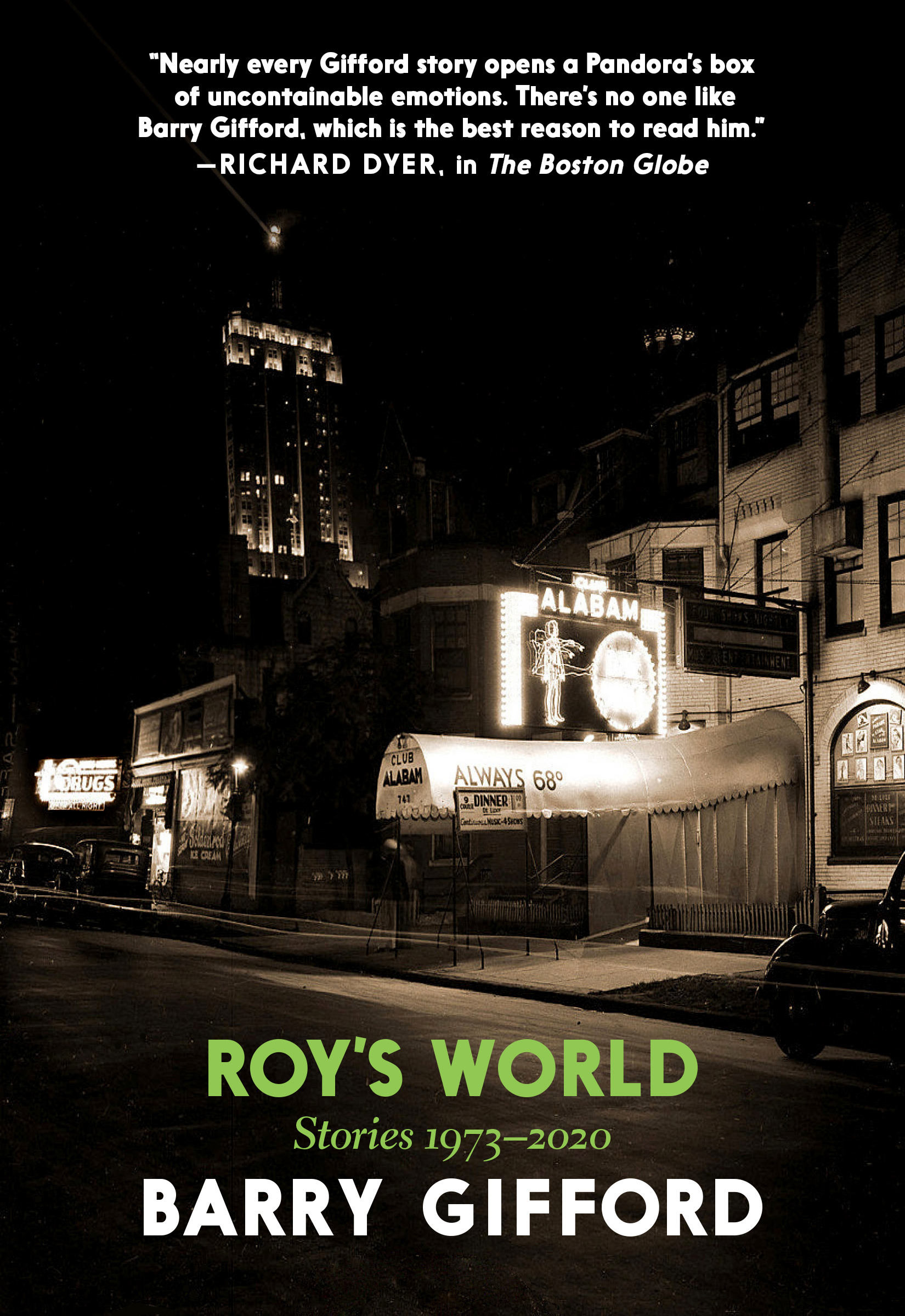Blows with Sticks Raining Hard
From the Archives
By Barry Gifford
Roy wanted to get home before dark, so he decided to hitchhike rather than wait for a bus. At ten past five, when he left Little Louie’s, the sky was gray with black stripes painted on the clouds. Snow began to fall as Roy stood in the slush next to the curb with his right thumb out.
He’d been sitting in the back booth at Louie’s reading Joseph Conrad’s Congo Diary, which he’d checked out of the Nortown branch library after having read Heart of Darkness. Roy had decided to write his next book report on Heart of Darkness, and his English teacher, Mr. Brown, had mentioned Conrad’s Congo Diary as being interesting background material for the story. Roy enjoyed reading passages from Conrad’s diary to his friends, especially to the girls, who hung out in Louie’s after school.
“To Congo da Lemba after passing black rocks long ascent,” Roy read to them. “Harou giving up. Bother. Camp bad. Water far. Dirty. At night Harou better.”
After hearing this, Bitsy DiPena said, “Africa sounds icky. Why would anyone want to go there?”
“For jewels and ivory and minerals,” Roy told her, “and slaves, of course.”
“There’s no slavery any more, I don’t think,” said Susie Worth, as she combed her long, blonde hair, which she did constantly. “Not in nineteen sixty-one.”
“Arabs still have slaves,” Jimmy Boyle said, “and some African tribes, too. I learned it in history.”
“In the evening three women of whom one albino passed our camp,” Roy read aloud. “Horrid chalky white with pink blotches. Red eyes. Red hair. Ugly. Mosquitos. At night when the moon rose heard shouts and drumming in distant villages. Passed a bad night.”
“Spooky,” said Susie Worth, biting on her comb.
“Spooky and icky,” Bitsy DiPena said.
“Row between the carriers and a man about a mat. Blows with sticks raining hard.”
“Stop it, Roy!” said Bitsy. “I don’t want to hear any more.”
It was getting colder as the light disappeared and snow came down harder. Roy kept his thumb out but nobody stopped. People were just off work, hurrying home or to the grocery store. Roy began walking, turning every few steps to show drivers his thumb. Finally, a car pulled over, a dark green Plymouth sedan. It slowed, then idled a few yards ahead of Roy. He ran up to the Plymouth and opened the front passenger side door. The driver was a middle-aged man wearing an overcoat and a homburg hat. He had wire framed glasses and white hair.
“I’m going to Peterson,” Roy said.
“Hop in,” said the man. “That’s in my direction.”
Roy got into the car and pulled the door closed. The car heater was on full blast.
“Good to be out of this weather,” the man said.
“Yeah, thanks,” said Roy. “Didn’t think anybody was going to stop.”
“People are afraid to these days. You never know who you’re picking up.”
“I’m just a kid, though,” said Roy.
“Even so,” the man said, “you’d be surprised the things that happen.”
Roy glanced again at the driver. He looked like he could be a minister. His face was bland, almost colorless.
“What’s your name, son?”
“Roy.”
“You go to high school?”
“Yes, sir. I’m a freshman.”
“You’re about fourteen, then.”
“Almost.”
“What are you interested in, Roy? What subjects?”
“Sports, mostly. I like to read, too.”
“Good, good,” the man said. “Are you reading a book now?”
“Yes. Joseph Conrad’s Congo Diary.”
“Really? That’s impressive, Roy. Do you like it?”
“I like his descriptions of the people and places along the river where the boat stops. The crew walk inland sometimes and make camp. There’s lots of insects and sickness. A boy gets shot. The boat has to avoid rocks that appear suddenly in the river. It’s pretty exciting.”
“You want to travel, Roy? Go to foreign places?”
“Uh huh. My uncle’s been all over the world, he’s always going somewhere. Right now he’s in Mongolia. I’m going to be like him.”
“What about the Bible, Roy? Do you read the good book? Are you a Christian?”
“My mother’s a Catholic, but it doesn’t interest me much. This is Peterson,” said Roy. “You can let me out here.”
“It’s awfully bad outside,” said the man. “What street do you live on? I can take you there.”
“Rockwell, but you don’t have to. I can walk over.”
“It’s only a couple of blocks out of my way. I’ll take you.”
The driver turned left on Peterson. The sky was completely black now.
“Where on Rockwell, Roy?”
“Near the corner,” Roy said. “Here’s okay.”
The driver pulled the car over and stopped.
“You should go to church, Roy,” he said. “You’re a very bright boy. Christianity will help you to understand the mysteries of life.”
The man placed his right hand firmly on Roy’s left leg, up high, near his crotch. Roy yanked down hard on the handle of the passenger side door and got out of the car. He slammed it shut. The dark green Plymouth pulled away slowly, sliding through the snow, Roy thought, like a crocodile oozing off a Congo riverbank. He dropped his books and made a snowball, packing it hard with ice, then threw it at the car. The snowball hit the rear window, but the driver did not stop. Roy made another iceball. The Plymouth was almost out of sight. He didn’t know where to throw it. Roy was not wearing gloves and his fingers were freezing. His eyes were tearing up from the wind. He hurled the snowball as far as he could across the street into the darkness.
“Night cold,” Roy said out loud. “Natives hostile. Back to boat. Harou suffering again.” ![]()
“Blows with Sticks Raining Hard,” by Barry Gifford, Vol. 92., No. 1., 2007
More From the Archives



